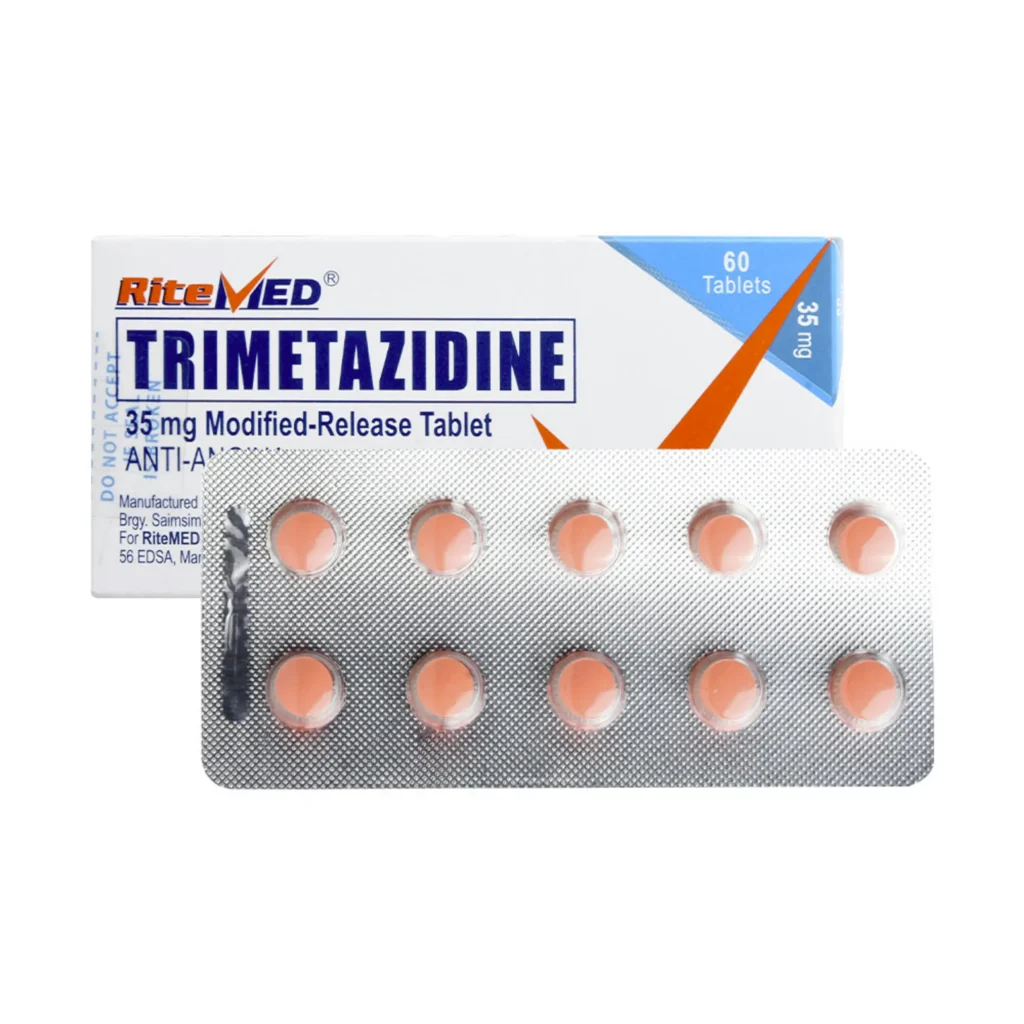What is Trimetazidine?

Trimetazidine is a medication primarily used to treat angina, a type of chest pain caused by reduced blood flow to the heart. As a fatty acid oxidation inhibitor, it helps the heart muscle cells use glucose more efficiently, improving energy production under low oxygen conditions.
This article provides comprehensive information about Trimetazidine, including its usage, precautions, side effects, and more. Whether you are already taking Trimetazidine or considering it, understanding how it works and what to expect is crucial for effective treatment and safety.
As always, please consult a medical professional for more information.
Importance of Following Guidelines
It is important to follow the instructions provided in the medication information leaflet when using trimetazidine. This will help ensure that you get the maximum benefit from the medication while minimizing any potential risks.
Methods for Taking Trimetazidine
Here are some guidelines on how to take trimetazidine correctly:
- With or without food: Trimetazidine can be taken with meals to ease any potential stomach discomfort.
- Consistency: Maintaining a regular intake schedule helps ensure stable drug levels in your system.
Regularity in Intake Schedule
Setting reminders or using a pill organizer can help in taking trimetazidine consistently, which is crucial for managing angina effectively.
Can I buy the medication over the counter?
Trimetazidine is a medication that cannot be purchased without a prescription. This is because it is a powerful drug with specific purposes, such as treating angina pectoris. Before prescribing trimetazidine, healthcare providers need to carefully assess patients to make sure that the benefits of the medication outweigh any potential risks.
Here are some reasons why trimetazidine is only available through a prescription:
- Controlled Usage: Healthcare professionals can closely monitor how much trimetazidine patients are taking and how their bodies are responding to it. This helps ensure their safety.
- Medical Supervision: With a prescription, doctors can make adjustments to the dosage or usage instructions based on each patient’s unique health conditions.
- Preventing Misuse: By requiring a prescription, there are restrictions in place to limit the chances of trimetazidine being used improperly, which could lead to harmful side effects.
What should I do if I forget to take/use Trimetazidine?
Missing doses can disrupt its effectiveness in managing angina. If you forget to take your medication:
- Near the next dose: Skip the missed dose and continue with your regular schedule.
- Close to the subsequent day: Do not double up to make up for the missed dose.
Always maintain a routine to minimize missed doses. Setting reminders or alarms can help keep track of your medication schedule. If you frequently forget, consult your healthcare provider for advice.
What precautions should I take?
When taking Trimetazidine, certain precautions should be kept in mind to ensure safe use:
- Contraindications: Patients with severe kidney disease, Parkinson’s disease, or other movement disorders should avoid Trimetazidine as it may worsen these conditions.
- Medical Conditions: Those with liver issues or a history of allergic reactions to similar medications should be careful.
- Healthcare Professional Consultation: Always consult your healthcare provider before starting or stopping Trimetazidine therapy. This helps tailor the treatment to individual health needs and prevents potential complications.
Following these guidelines can enhance the safety and effectiveness of Trimetazidine treatment.
What are some common side effects of Trimetazidine?
Trimetazidine is generally well-tolerated, but some users may experience mild side effects. These often do not require medical attention and can be managed at home.
Common side effects of trimetazidine include:
- Nausea: Eating small, frequent meals can help.
- Dizziness: Avoid sudden movements and stand up slowly.
- Headache: Staying hydrated and resting in a quiet environment may provide relief.
It’s important to monitor these symptoms and consult a healthcare professional if they persist or worsen.
What are some rare but serious side-effects that I need to seek medical advice immediately?
While trimetazidine is generally well-tolerated, rare but serious side effects may occur:
- Parkinsonian symptoms: These include tremors, rigidity, akinesia, hypertonia, and gait instability.
- Severe allergic reactions: Symptoms like swelling of the face, tongue, or throat, severe dizziness, or trouble breathing require urgent medical care.
- Cardiac issues: Signs such as irregular heartbeat or chest pain should prompt immediate medical consultation.
Recognizing these symptoms early and seeking prompt medical advice is crucial to ensure safety while using trimetazidine.
What food or medication should I avoid when I take this medication?
Foods and Beverages
Certain foods and beverages can interact with the absorption or effectiveness of Trimetazidine. It is advisable to:
- Avoid consuming excessive amounts of grapefruit juice, as it can affect the drug’s metabolism.
- Maintain a balanced diet to support overall heart health while on this medication.
Medications
Several medications may interact with Trimetazidine, requiring careful management:
- Beta-blockers: May need dose adjustments or spacing intervals for safe use together.
- Calcium channel blockers: Close monitoring is necessary to manage potential interactions.
- Nitrates: Coordination with healthcare providers ensures optimal treatment outcomes when used in conjunction.
Always consult your healthcare provider before combining Trimetazidine with other medications.
How should I Store and Dispose Trimetazidine?
To keep Trimetazidine stable, store it at room temperature away from excessive heat and moisture. Avoid storing it in bathrooms or humid areas.
When getting rid of unused or expired Trimetazidine tablets, follow local rules. You can return them to a pharmacy for safe disposal or use specific medication disposal programs.
It’s important to keep medications away from children and pets to avoid accidental swallowing. By storing and disposing of them correctly, you not only maintain their effectiveness but also promote safety and protect the environment.
Read More: Ambroxol Tablets: What is it and What you need to Know
FAQ
Why is trimetazidine not used in the US?
Trimetazidine is not approved for use in the United States by the Food and Drug Administration (FDA). The primary reasons for its absence in the US market include safety concerns raised by regulatory agencies, a lack of robust evidence demonstrating clear clinical benefit, and the availability of alternative treatments for angina pectoris that are already approved and widely used in the US.
What are the side effects of trimetazidine?
The most commonly reported side effects of trimetazidine include parkinsonian symptoms (such as tremors, rigidity, and gait disorders), dizziness, headache, nausea, and gastrointestinal disturbances. In 2012, the European Medicines Agency (EMA) conducted a safety review and found that trimetazidine may increase the risk of parkinsonian symptoms, leading to restrictions on its use.
Is trimetazidine safe?
The safety profile of trimetazidine has been a subject of concern for regulatory agencies. While it is considered generally safe when used as directed, there are potential risks associated with its use, particularly the risk of developing parkinsonian symptoms or exacerbating pre-existing Parkinson’s disease. Due to these safety concerns, the EMA has contraindicated the use of trimetazidine in patients with Parkinson’s disease, parkinsonian symptoms, or tremors.
Is trimetazidine over the counter?
No, trimetazidine is not available as an over-the-counter (OTC) medication. It is a prescription drug that requires a doctor’s prescription in the countries where it is approved for use, such as several European countries and some regions of Asia and Latin America.
Can trimetazidine lower blood pressure?
While trimetazidine is primarily used for the treatment of angina pectoris (chest pain caused by reduced blood flow to the heart), some studies have suggested that it may also have a modest blood pressure-lowering effect. However, this potential benefit is not well-established, and trimetazidine is not typically used as a primary treatment for hypertension (high blood pressure).
Can trimetazidine be taken without food?
According to the prescribing information, trimetazidine can be taken with or without food. However, it is generally recommended to take the medication at the same time(s) each day to maintain consistent levels of the drug in the body.
Can I take trimetazidine and carvedilol together?
Carvedilol is a beta-blocker medication used to treat high blood pressure, heart failure, and other cardiovascular conditions. There are no known significant interactions between trimetazidine and carvedilol. However, it is always important to consult with a healthcare professional before combining any medications to ensure safety and proper dosing.

